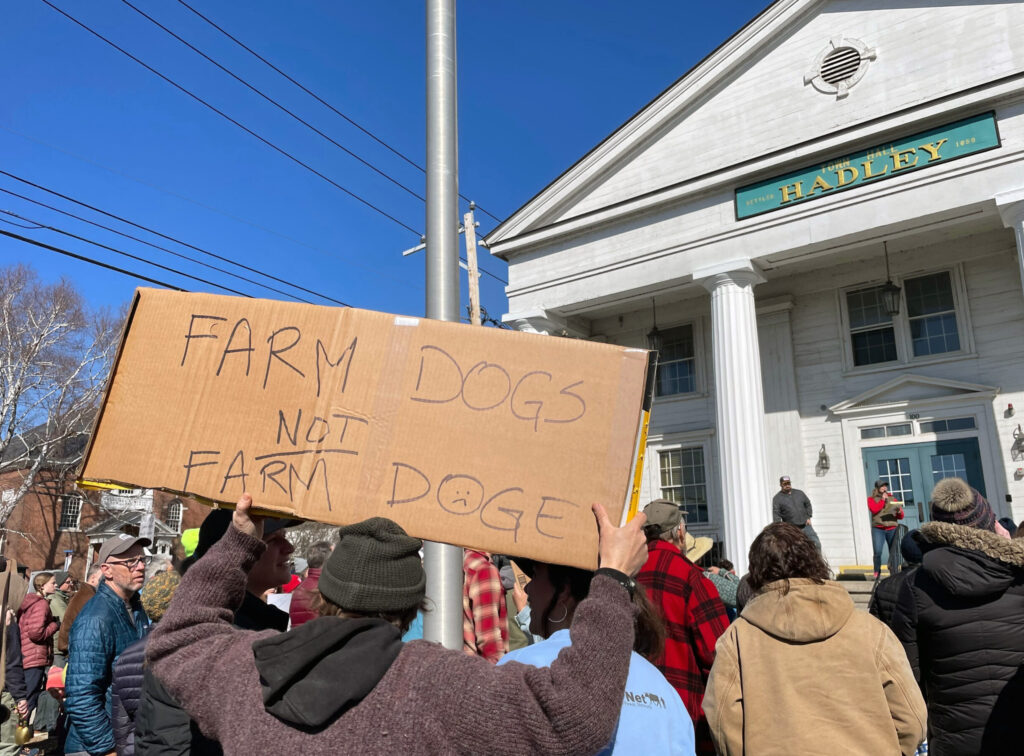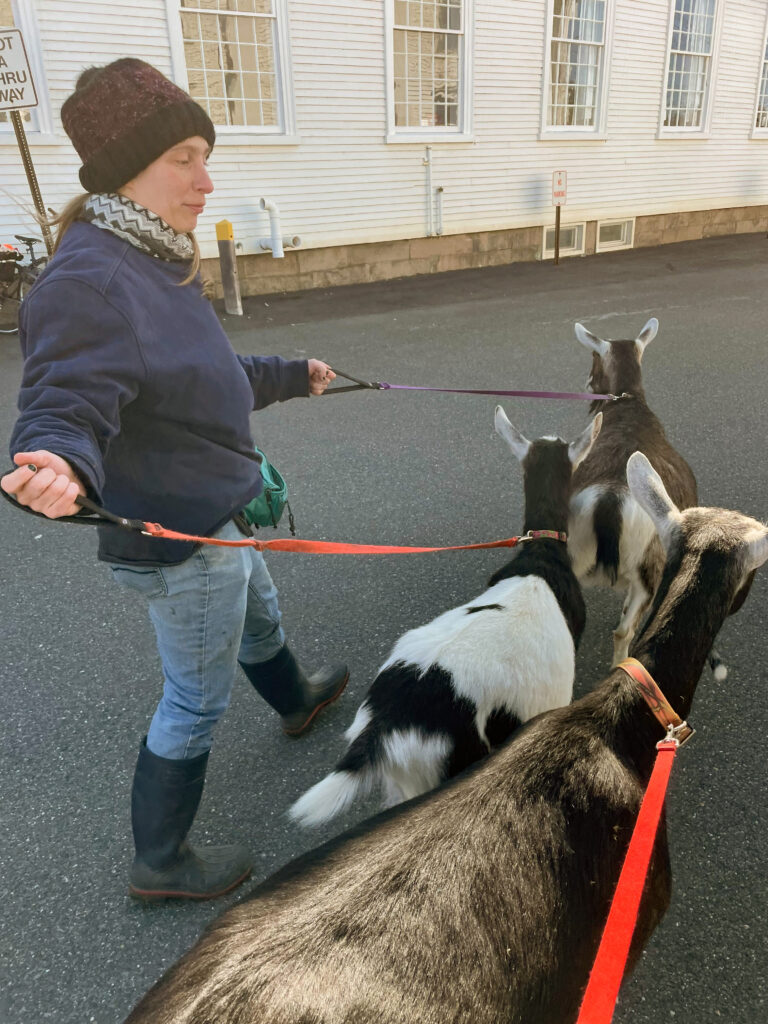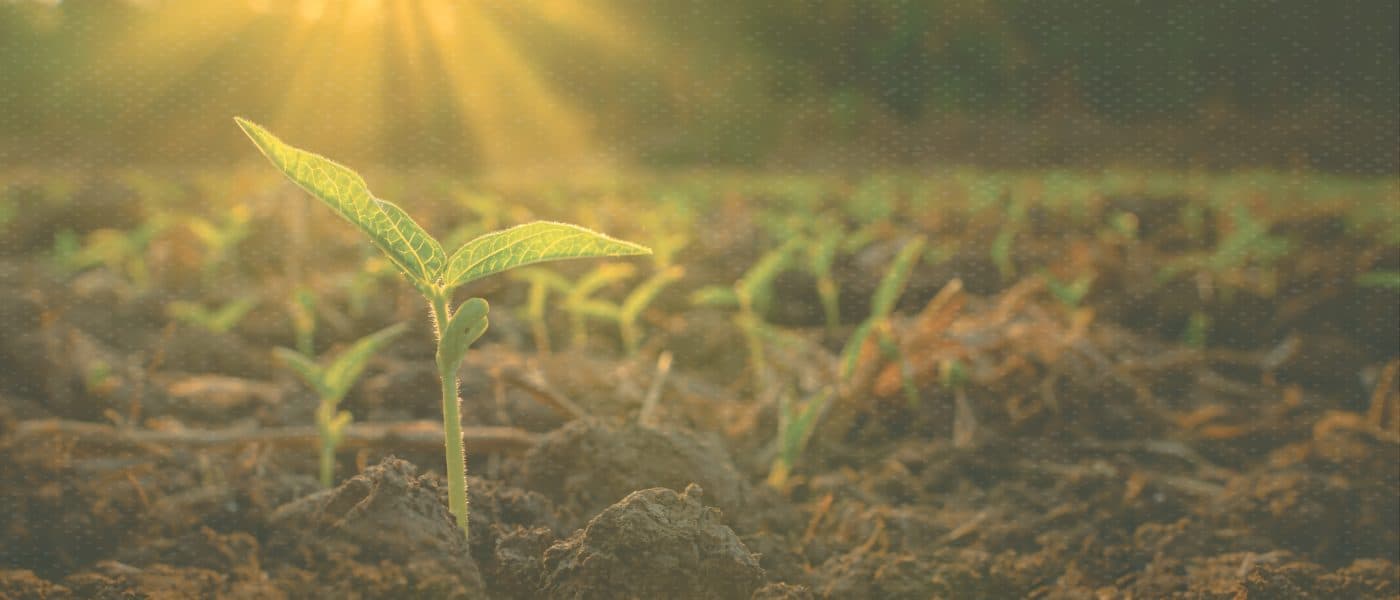On Sunday, an energetic crowd of farmers and farm supporters estimated to be 300 gathered in front of the town hall in Hadley, in the Pioneer Valley of Western Massachusetts. Their mission: to call attention to the impacts of decisions made by the Trump administration since January that are harming small and medium-sized farms. Farmers and folks concerned about farmers have been speaking out in town hall meetings, but to our knowledge, this gathering may be the first farmer-specific rally in the country.
A band played while the crowd assembled with colorful (in more ways than one) signs, farm dogs, tractors, and even goats! Farmer Kerry Taylor of Brookfield Farm in Hadley helped to organize the rally in just three days (along with Farm Aid partner Community Involved in Sustaining Agriculture). She welcomed the crowd and passed the mic to farmers, staff members representing Massachusetts’ two Senators and one Representative, as well as representatives from the Massachusetts Legislature. Sometimes the comments were drowned out by the honking horns of many supporters driving by.
Tractors parked along the road, including Will Dellacamera’s tractor, the one you might have seen at Farm Aid 2024 after it traveled from Connecticut to DC to secure a new disaster funding program for small farmers (which has also been blocked and left unimplemented in the new year). Farmers and eaters rang cowbells and waved signs that read “Farms feed us,” “Muck out Musk,” “No NRCS No Farms No Food” and (my favorite) “Farm dogs, not farm DOGE.”

Farmers Shared Their Stories
Anne Diemand of Diemand Farm in Wendell, which raises turkeys, chickens, eggs, and beef on 200 acres, told the crowd that her farm stood to lose $120,000 from the government’s breach of her Rural Energy for America Program (REAP) contract—money the farm has already borrowed on the promise of reimbursement and had started to spend in compliance with their contract. “If this funding isn’t released, it’s a whole lot of money we’re going to have to come up with. Bottom line, we borrowed a lot of money and we may have to pay it all back. It’ll take us a long time, but we’re farmers, and we pay our bills.”
Earlier this month, the USDA announced that it would cancel $1 billion in funding for the Local Purchasing Assistance Program (LPAP) for fiscal year 2025. Schools, food banks, and other food access programs in Massachusetts were counting on $12 million for this second half of FY 2025. This program provided funding to schools and other organizations to buy food directly from local farmers. Harrison Bardwell, whose 50-acre Hatfield farm provides a range of vegetables to institutional partners through LPAP says that the effects of this cancellation on his farm are significant. “We have bills to pay and employees to support. This loss in sales has a large impact on our farm.”
At his turn on the mic, Ryan Voiland of Red Fire Farm in Granby outlined a series of natural disasters that local farmers have faced in the last few years, from the catastrophic and widespread flooding in 2023 to the record-breaking drought last year. He said that these disasters make it harder for farmers to survive. “Massachusetts lost 4,000 acres of farmland last year,” he said, explaining that farmers operate on “razor thin margins.” He said that on top of the effects of increasingly extreme weather, the impact of these funding cuts would be severe.
“This will result in Americans deprived of nutritious food, a more degraded environment, food systems that are less reliant to climate change, and more farms going out of business. All just so the richest billionaires can get more tax cuts?” – Ryan Voiland
Voiland co-manages Red Fire Farm in Granby with his wife Sarah Voiland. They grow on nearly 200 acres to supply diversified vegetables around the valley through CSA, markets, and wholesale. He elicited cheers and cowbells from the crowd when he announced that they had joined a lawsuit with the lawyers at EarthJustice to “sue the Trump administration for freezing and attempting to discontinue our REAP grant for making solar energy for the farm.”
Another speaker affected by these cuts was Suna Turgay of Flowerwork Farm in Florence, who was expecting funding through the now-frozen Climate Smart Commodities Program, which she explained is an investment in soil health, because it would support practices that protect water supplies, prevent soil erosion, and preserve natural resources. Turgay says that practices that build soil are a win-win, because they also help farmers’ bottom lines: “Increased soil health means increased productivity.”
“Programs like Climate Smart are a good investment,” Turgay said, adding that while they represent a small piece of national funding for agriculture, “they can set a farmer like me up for a lifetime of success.”
The freeze has led to furloughs in several organizations who administer grants under these programs, including Pasa Sustainable Agriculture, under whom hundreds of Massachusetts farmers like Turgay and Voiland were expecting to receive support for climate smart practices over the next four years. Two different courts have ruled that the Trump administration release these funds, but farmers say that neither the farm support agencies nor the farms themselves have been given any indication that the funding will be restored.

Elected Officials Speak Out
“Farmers face enough uncertainty on a day-to-day basis— floods, droughts, freezes, locusts—” said Massachusetts State Representative Natalie Blais, addressing the crowd, “to have the federal government cut these programs and add to the anxiety and uncertainty is absolutely unforgivable.”
“Together, we’re fighting for food security,” said State Senator Jo Comerford, closing out the rally with several of her colleagues from the state legislature. Senator Comerford represents a farming-heavy district that encompasses much of Hampshire, Franklin, and Worcester counties and serves as Senate Vice Chair of the Joint Ag Committee.
Standing and speaking alongside Senator Comerford were Massachusetts State Representatives Natalie Blais of 1st Franklin District, Mindy Domb of the 3rd Hampshire, Aaron Saunders of the 7th Hampden, and Homar Gomez of the 2nd Hampshire District. Representatives Saunders, Blais, and Gomez are all members of the Joint Ag Committee in the Massachusetts legislature, with Blais serving as House Chair and Saunders as House Vice Chair
“Unity is our weapon,” said Rep Domb, “If you come for one of us, you’re getting all of us.”
Representatives from Senator Elizabeth Warren’s and Senator Ed Markey’s offices also addressed the crowd. Reading a message from Senator Markey, Jesse Lederman was met with cheers when he concluded with a message aimed at the Trump administration, “Release all the USDA funding without further delay and honor contracts with our farmers, or we’ll see them in court.”
Even after the rally, farmers and others stayed on the corner of the busy intersection with their signs, with Neil Young and John Mellencamp blaring from speakers on Will’s tractor. Organizer Kerry Taylor summed the day up perfectly, “Hopefully this inspires others to take action too!”
![child holding a sign at a rally that says "We [heart symbol] our farmers"](https://www.farmaid.org/wp-content/uploads/2025/03/massachusetts_farmer_rally-we_heart_our_farms-1400x600.jpg)


